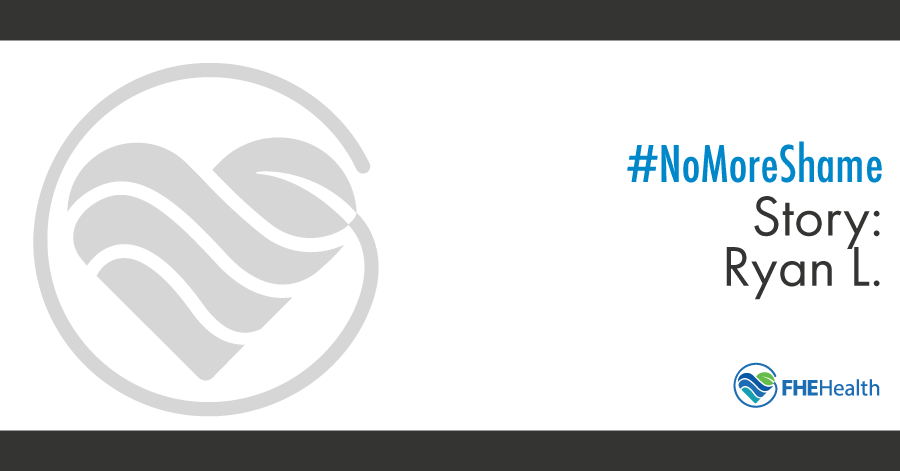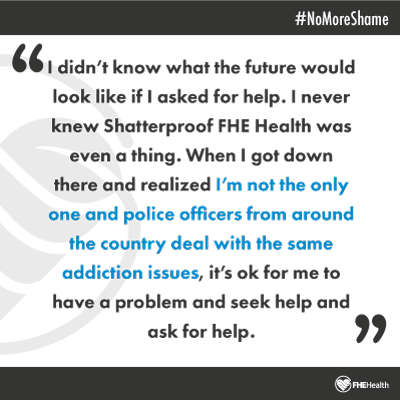
Ryan, 42, a husband, father of two, veteran, and police officer in Indianapolis, will never forget his darkest moment in the clutches of alcoholism—even if he wanted to. “It’s on video,” he said in a recent interview. Any time he is tempted to forget what life was like in active addiction, he can watch the footage that his wife recorded.
It was an ordinary weekday morning. After a night of heavy drinking, Ryan had passed out drunk while standing over the kitchen island. He was barely breathing: “one breath every 20-30 seconds,” which was evident from the barely perceptible movement of Ryan’s back in the video.
When the kids came down for breakfast and were getting ready for school, Ryan didn’t budge.
“This had become normal for my kids to see,” he recalled later.
This time, though, would be different. That is because Ryan’s wife, who at the time was new to recovery from alcohol, had decided to record the scene on Ryan’s phone and share it with him.
“When I woke up in bed—Ryan didn’t remember how he got there—and watched the video, it was like a dagger in the heart,” Ryan said. He realized the same scene had played itself out so many times before that his kids now viewed it as normal.
Minutes later, Ryan called the wellness unit at the Indianapolis Metropolitan Police Department and said he needed help for a drinking problem. Within days, he was in treatment at Shatterproof FHE Health, a specialized treatment program for first responders.
What Triggered the Problems with Alcohol
 Ryan’s alcohol problem did not happen overnight. It developed over months and years and was rooted in depression, anxiety, and post-traumatic stress disorder (PTSD). Like many first responders, Ryan had experienced more than his fair share of trauma. During his 15 years of service with the Indianapolis Police Department, he had lost coworkers in the line of duty.
Ryan’s alcohol problem did not happen overnight. It developed over months and years and was rooted in depression, anxiety, and post-traumatic stress disorder (PTSD). Like many first responders, Ryan had experienced more than his fair share of trauma. During his 15 years of service with the Indianapolis Police Department, he had lost coworkers in the line of duty.
At the age of 34, Ryan was diagnosed with depression, anxiety, and post-traumatic stress disorder and prescribed medication. Ryan chose not to take the medication and to drink instead.
“That’s when I first asked myself if I was drinking too much,” he said.
Around the same time, Ryan and his wife “started attending country music festivals.” They “bought a camper and boat” and soon fell into a regular habit of “hanging out that all revolved around alcohol.”
The drinking that “started out socially” only continued with the pandemic lockdown in 2020.
“The social stuff went away but the alcohol didn’t go away,” Ryan said. “We just bought it and would bring it home, drink, and crank the music up.”
The Professional Consequences of Untreated Alcoholism
Ryan said he struggled with untreated alcoholism for 8-10 years. During that time, there were coworkers who asked him about it or would drop hints, at which point Ryan would lie. One telltale sign that he had been drinking was when he’d “start political arguments online, so “they’d see that and would know.”
On one occasion, Ryan was disciplined for posting a drunken, political tirade online: “I was suspended for nine days and lost a couple of my special duties, so no longer was a field training officer who trained new recruits or a master patrolman.” (Both titles are marks of seniority that must be earned. In the case of a master patrolman, it requires 10 years of service to qualify.)
Treatment and the Journey to Recovery
Ryan’s time in treatment was “eye-opening”:
I didn’t know what the future would look like if I asked for help. I never knew Shatterproof FHE Health was even a thing. When I got down there and realized I’m not the only one and police officers from around the country deal with the same addiction issues, it’s ok for me to have a problem and seek help and ask for help.
In treatment, Ryan was able to explore why he was “drinking and medicating with alcohol” and then learn how to deal with these problems without defaulting to alcohol.
He also had a conversion experience during his time away in rehab: “I’m a Christian now and accepted Jesus as my Lord and Savior and was baptized when I got home,” he said.
Ryan saw a therapist for a time after he got home but ultimately benefitted more from the regular Zoom support group that he attended with peers from Shatterproof FHE Health.
Those connections forged in treatment were invaluable.
“We all stayed in touch,” Ryan said.
624 Days Sober and Counting: Why It’s Worthwhile
On the day of our interview, Ryan was celebrating 624 days of sobriety. He attributes this success to his relationship with God and a close group of accountability partners. He’s also in some men’s ministry groups that challenge him to be a better husband and father.
Seeing that his kids and wife are noticing that he’s “changing and sticking to it” is one reason, Ryan said, that life in recovery is so rewarding. Also, “I feel physically like I’m alive again. I’m happier.”
Words of Encouragement for Anyone with an Alcohol Problem?
Ryan wants more people to know that it’s okay to ask for help for a problem with alcohol and that “just because you ask for help doesn’t mean you’re going to get fired.” There are job protections that ensure “people can go back to work and live their normal life.” Ryan’s advice: “Take the first step, because the first time you ask someone for help there’s no turning back from that. The cat is out of the bag”— and that’s a good thing.
Shame and stigma, on the other hand, only contribute to more people dying from alcoholism and other addictions. Here Ryan invoked the words of a counselor at FHE Health, Ray, who said, “‘If we recover loudly, we keep people from dying quietly.’”
If we recover loudly, we keep people from dying quietly.
“There are a lot of guys who’d never say anything and would carry it to the grave,” Ryan continued, “but I found that if you just share it and get rid of the stigma and just ask for help—it completely turned my life around.”
There’s no shame in getting help for a drug or alcohol problem or mental health issue. That’s the message of our “No More Shame” campaign, which seeks to reduce the stigma surrounding these health issues. In continuation of that theme, this story is part of a regular series featuring the true stories of people who asked for help and found hope and healing.
Are you suffering? You can start feeling better. Call our 24/7 helpline at 1-844-335-8506.






